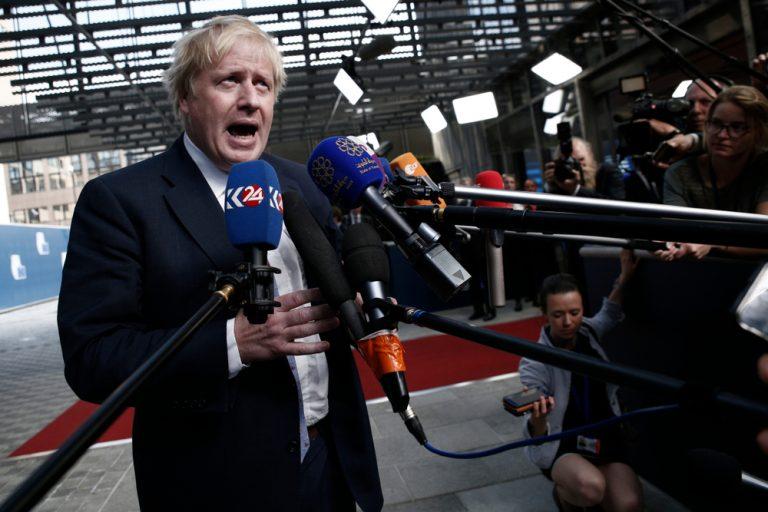
Despite resigning from the cabinet back in July, Boris Johnson is never far from the headlines.
Perhaps one of the most well-known advocates of Vote Leave, Boris Johnson had long been a popular figure in British politics, famed for his superfluous use of language and eccentric character.
However, in recent months, the former London Mayor has proved an increasingly divisive figure within the Conservative party.
Various incidents have cast doubts over whether the former Etonian can indeed emerge as a credible successor to challenge the increasingly unstable leadership of Theresa May.
It seems the former foreign secretary continues to abide by the phrase – there is no such thing as bad publicity.
Towards the end of Johnson’s tenure at City Hall, Boris Johnson commanded an impressive approval rating of 61 percent compared to then Prime Minister David Cameron’s 23 percent, according to polling by YouGov.
Johnson enjoyed a remarkable popularity in an era characterised by mass disillusionment with politics and politicians, and falling turnouts.
It seems Johnson bucked the trend, in turn carving his name as a powerhouse in Conservative politics.
Indeed, he was widely regarded as one of the most influential figures within the party, proving instrumental in securing the success of the Leave Campaign.
The Brexit referendum upset has no doubt marked itself as one of the most seismic political events in the UK’s history, perhaps a testament to Johnson’s gravitas.
However, according to YouGov’s polling, Johnson’s has continued to decline in recent months, suggesting that like most politicians and their relationship with the public, all honeymoons must inevitably come to an end.
Public confidence in Johnson continues to weaken with his support base continuing to fragment, particularly following the fallout from a series of inflammatory comments he made regarding muslim women.
Disintegrating public confidence in Johnson has only been compounded by mounting criticism from his Conservative peers, as the party too question his viability.
Most recently, the chancellor Philip Hammond added to concerns over Johnson’s capabilities as a potential leadership contender, dismissing his ability to engage effectively in ‘grown-up politics’.
Ahead of his speech at the party conference in Birmingham, Hammond told the Daily Mail:
“Boris is a wonderful character, but he’s never been a detail man.”
Moreover, the chancellor suggested that to date, Johnson’s political achievements were limited to the installation of the fleet of ‘Boris Bikes’ he has become associated with.
As such, Hammond decidedly dismissed the notion of Johnson as a future PM. When questioned on the matter, he commented: “I don’t expect it to happen”.
Boris Johnson is known for his tendency to sprout elaborate political statements, often cloaked in colourful adjectives.
Yet, many are starting to question whether there is indeed any substance beyond the style – particularly with respect to Brexit.
His achievements during his time as Foreign Secretary too remain elusive.
His short tenure was dominated by inconsistency, in a government position that necessitates resoluteness, particularly when navigating the murky waters of international diplomacy.
Nevertheless, former journalist and MP for Uxbridge doesn’t seem to be backing down just yet.
A vocal opponent of the Prime Minister’s chequers deal, Johnson has repeatedly taken to his weekly column in The Telegraph to criticise the government’s lack of progress in Brexit negotiations.
Most recently, in a lengthy 4,500 word article, Johnson laid out a potential alternative for Brexit in the form of a ‘Super-Canada’ style deal, perhaps marking his most clear bid for leadership yet.
Specifically, Johnson called for May to renege on the December agreement, keeping Northern Ireland in the customs union and parts of the single market in a bid to avoid enforcing a hard border.
Johnson also advocated that the UK should opt for a “super Canada trade deal” with zero tariffs and quotas, alongside prioritising investment in technology to aid customs.
Moreover, in an interview with the BBC, Johnson crucially failed to dampen speculation that he was indeed preparing to pursue the top job.
“I resigned from the Cabinet because I could not see how I could not see how I could support an arrangement I don’t think is in this country’s interest.”, he said, when pressed on the matter.
Whilst his opponents remain unconvinced of his ‘super Canada’ alternative, Johnson shows no signs of slowing down, as he continues to take aim at Theresa May’s government.
Boris Johnson just inflicted Theresa May with the greatest trolling in historyhttps://t.co/ewwk82HSI2 pic.twitter.com/JhH4DimBk3
— Mirror Politics (@MirrorPolitics) October 1, 2018
https://platform.twitter.com/widgets.js
Having resigned earlier this year from his cabinet position, Johnson will not be making an official speech at this year’s party conference.
Nevertheless, Boris Johnson’s absence will be far from felt, as he continues to take up the column inches, and attempt to dominate the front pages.
The question still remains – will Johnson stick to commenting behind the scenes, or will he seize the so-called ‘poisoned chalice’ of Brexit?
With day two of the conservative conference well under way, all eyes will be on the Prime Minister, Theresa May, who is set to delivers her keynote speech on Wednesday.
